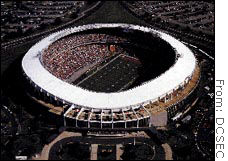
NEW YORK (CNN/Money) - Major League Baseball appears to be on the verge of moving a team back to the nation's capital. But as a business, that club will come to the plate with two strikes already against it.
 |
|
| A last-minute move into RFK Stadium will cause problems for the team and its business. |
The decision to move the Montreal Expos has been overdue since July's All-Star game. But even after Major League Baseball's executive council met in Milwaukee Thursday to discuss the relocation of the Expos to Washington, the only official thing to come out of the meeting was more talk, and another written-in-the-wind deadline.
The quickest a move to Washington will likely be announced is in the last days of the regular season, which ends Oct. 3, which even baseball executives concede is awfully late for a decision.
"I think we're all running out of time," Bob DuPuy, baseball's chief operating officer told reporters after the meeting.
Even if the announcement comes before then, baseball still must conclude negotiations with D.C. and the potential new owners on such tricky issues as a sales price for the team and a new $465 million stadium.
So by the time the issue is finally resolved, ticket sales, marketing, and preparing RFK Stadium to host baseball will be far behind schedule for next year's season. And that puts the prospective team in a serious hole, one that it may take years to climb out of.
"You never get a second chance to sell your first tickets," said Marc Ganis, a sports consultant who has worked on a number of last-minute franchise relocations. "How you price them, and how fans feel about transaction with the team, are absolutely vital."
It's Bud's fault, mostly
Blame for the foot-dragging falls mostly on Commissioner Bud Selig.
"One thing Bud Selig will do is not jump out until he has a full consensus," said Maury Brown of the baseball research group SABR, and one of those trying to bring baseball to Portland, Ore.
| Related columns
|

|
|
|
|
The delay raises questions whether RFK, a dinosaur of a stadium without the amenities modern corporate ticket buyers have come to expect, can be ready in time. Renovations will cost at least $13 million, and it will require an Olympian -- Athens, that is -- rush to complete them by Opening Day.
It won't be hard for the team to outdraw the 10,133 it averaged every night this year in Montreal -- a couple of minor league teams did that this year.
But if the team doesn't win, or if early reviews focus on RFK's crumbling facilities, it will take awhile to convince fans to come out. Mix together on-field losses, empty seats and bad stadium reviews? It's the second coming of the Tampa Bay Devil Rays.
What's more, the D.C. city council has yet to come through with public money for a new stadium. If a deal isn't signed, sealed and delivered by the time supporters leave office Dec. 31, it may be years to get a new stadium.
"Once you announce you're moving the team, you give up your key piece of leverage," said Ganis, who worked on the move of football's St. Louis Cardinals to Arizona. "When they moved, a new stadium deal was expected to take a matter of months. It took eight years."
At least one report says Selig may characterize the decision play in Washington in 2005 is an interim move. That would be an effort to maintain its leverage in talks about a new stadium. But that's not a great way to get the city to spend money improving RFK or to get fans to commit to a team that could conceivably be gone before they get to know the players.
Bigger battles ahead
Even if baseball announces D.C. as the new home of the Expos before the end of the regular season, that only completes part of the battle.
| SportsBiz
|

|
| Click here for SI.com sports coverage
|
|
|
|
The other 29 teams collectively own the team, and final negotiations on a sale of the team have to be concluded. Plus, there's still a pile of nasty civil litigation to be settled involving the league and the team's previous owners.
Baseball will have to reach an agreement with Baltimore Orioles owner Peter Angelos, a member of baseball's executive council. Angelos, who made his millions as a plaintiff's attorney, has vowed to fight a new team 35 miles from his team's home.
The problems and challenges facing the team's move are a shame. Washington D.C. has become a good potential market for the sport since its second baseball team left town more than 30 years ago.
The region has seen robust population growth since 1980. It has also added the nation's second largest subway system. And, of course, the capital boasts an army of lobbyists eager to entertain clients. Even so, the team might not be able to overcome the problems the league is throwing at it.
At a time when baseball has never been more popular, only Selig could snatch business defeat from the jaws of victory this way.

|

